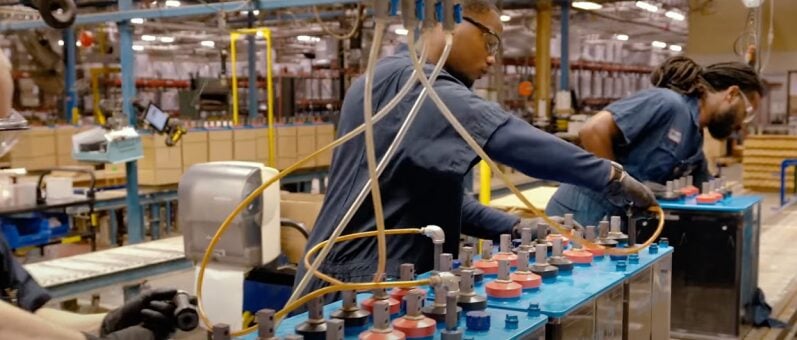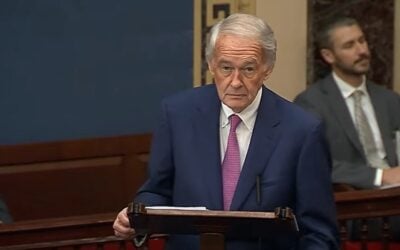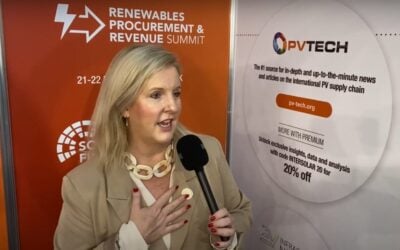
Battery Council International (BCI) is asking Congress to defend US domestic battery supply chains.
BCI published a briefing for legislators outlining steps to “create jobs, support domestic battery manufacturers and defend the US economy from unfair foreign competition.”
Enjoy 12 months of exclusive analysis
- Regular insight and analysis of the industry’s biggest developments
- In-depth interviews with the industry’s leading figures
- Annual digital subscription to the PV Tech Power journal
- Discounts on Solar Media’s portfolio of events, in-person and virtual
BCI is a trade association for the North American battery industry which has been active for over 100 years and has over 160 member firms comprised of led battery manufacturers and recyclers, marketers and retailers, suppliers of raw materials and equipment and expert consultants.
The association has helped shaped the battery industry as it is today, with historical success in creating US policy and regulation. For instance, BCI collaborated with California legislators on the Lead-Acid Battery Recycling and Cleanup Fund established in 2016 and in 2021, with the US Department of Energy (DOE), created national lab partnerships and research collaborations for the DOE’s Energy Storage Grand Challenge.
In BCI’s policy recommendations to Congress, the association is focusing on five specific policy actions in three areas:
“Manufacturing
1. Maintain Section 45X Advanced Manufacturing Provision – Ensure the existing Section 45 provision remains in place as a tool for domestic battery manufacturers to protect and grow their operations.
2. Remove Tax Penalties for Domestic Battery Production – Eliminate punitive excise taxes on strategic battery raw materials to support domestic battery manufacturing by passing the USA Batteries Act
Department of Energy
3. Support Key DOE Programs – Certain programs help spur innovation and growth in domestic battery technologies, including research and development as well as partnership with national laboratories.
Safety
4. Set Workplace OSHA Regulations Based on Real-World Results – Increase collaboration between the Department of Labor and BCI experts to develop workplace safety regulations that are feasible and based on the best available real-world data.
5. Keep Workers Safe and Protect Domestic Supply Chains – Support the EPA’s labeling initiative to facilitate collection and sorting improvements for safer battery recycling”
Maintain Section 45X Advanced Manufacturing Provision
The 45X Advanced Manufacturing Production Tax Credit (PTC) is a key piece of legislation that has encouraged investment in clean energy manufacturing facilities in the US. Though US president Donald Trump has taken aim at Biden-era clean energy policies through the “Unleashing American Energy” executive order, support for the 45X Advanced Manufacturing PTC could remain.
Both the president and the US Republican party have spoken about increasing US manufacturing, including manufacturing of energy storage. This argument is seen in Trump’s announced tariffs on China, Canada and Mexico and on the reinstatement of the section 232 tariffs on steel and aluminium.
While the president froze funds for clean energy and energy storage projects in both Democratic and Republican districts, the PTC, in a sense, awards manufacturers for using domestic content. This encouragement would align with the views espoused by Donald Trump.
Remove Tax Penalties for Domestic Battery Production
The USA Batteries Act looks to eliminate the excise tax on lead oxide, antimony and sulfuric acid, which are the primary inputs used in lead batteries. Proponents of the act say that keeping these excise taxes in place “gives foreign battery manufacturers an unfair advantage on the cost of these materials.”
The tax only applies to US manufacturers and increases manufacturing costs, which BCI says creates a “give-away” to foreign imports.
The council noted of the act: “The domestic battery industry needs support from Congress in eliminating these taxes. Policymakers in the House of Representatives, led by Rep. Dan Meuser (R-PA), introduced in the last Congress the USA Batteries Act.”
“BCI urges Congress to act quickly on the recommendations of Republicans like Congressman
Meuser to remove punitive taxes on U.S. battery firms.”
Support Key DOE Programs
BCI has previously collaborated with the DOE and is asking that Congress support its programmes. The DOE and its Loan Programs Office (LPO) embarked on soaring grant and loan activity after Donald Trump’s second term election, as reported by Energy-storage.news (Premium access article). Due to Donald Trump’s order to pause fund disbursement through the Inflation Reduction Act (IRA) and Bipartisan Infrastructure Law (BIL), the fate of many of the LPO’s conditional commitments and finalised commitments are in the air.
The department announced loans or loan guarantees to US clean energy tech firms including recycler Redwood Materials and vertically integrated lithium-ion BESS firm Kore Power, as well as downstream projects like a massive green hydrogen hub in Utah, and solar and storage projects with wider community benefits in California and Puerto Rico.
BCI says that the DOE and its national laboratories are not only critical to battery research, but that also ensure that the domestic battery industry is globally competitive, stating: “The national laboratories are uniquely suited to complement industry capabilities to harness new innovations such as AI for public good. Unique, world-leading scientific user facilities at the national laboratories generate scientific data that is unavailable anywhere else in the world.”
Set Workplace OSHA Regulations Based on Real-World Results
The US president has also weakened worker protection agencies, illegally firing key officials from the Equal Employment Opportunity Commission (EEOC) and the National Labor Relations Board (NLRB). Similar actions from Elon Musk’s department of government efficiency, which has unprecedented access to federally collected data and vaguely defined responsibilities about reducing government spending, send troubling signals for the future of the Occupational Safety and Health Administration (OSHA) and the Department of Labor (DOL).
BCI recommends that congress should work with the DOL, providing regulatory certainty to empower employers and protect employees. OSHA’s standards for occupational exposure to lead have been a point of contention, the standard is seen as outdated by many.
In 2024, the California Occupational Safety & Health Standards Board approved revisions to regulations for occupational exposure to lead. The old permissible exposure limit, the same as OSHA’s, is 50 micrograms per cubic meter of air, the new permissible exposure limit is 10 micrograms per cubic meter of air.
BCI says of protecting employees from lead: “Since 1997, BCI-member battery manufacturing and recycling companies have voluntarily implemented the world’s premier program to achieve employee occupational health goals for lead. These industry-led standards are significantly more protective than those currently required by OSHA.”
Keep Workers Safe and Protect Domestic Supply Chains
The BIL requires the Environmental Protection Agency to develop battery collection best practices and labeling guidelines by 30 September 2026. It is unclear if the agency will be able to complete this task or what its current progress on the task may be.
BCI highlights a 2021 report from the EPA, which found that there were more than 240 fires caused by lithium-ion (li-ion) batteries at 64 facilities between 2013 and 2020. These fires were associated with li-ion batteries entering the wrong waste disposal and recycling streams.
The council is making the case to Congress that labeling mandates would lead to safer battery recycling and more availability of materials through US supply chains.
Recently, speaking with Energy-Storage.news, North American lithium-ion battery recycling specialist Li-Cycle said that battery recycling will help the US become less reliant on foreign imports and “help bolster energy independence and national security.”
Conclusion
A 2024 BCI report estimates the domestic battery industry directly supports $8.1 trillion in economic output, or roughly 20% of the U.S. economy, with some 48 million jobs dependent on batteries.
While the future of multiple US federal agencies and billions of dollars in federal funding remains uncertain, key players in the battery industry are choosing to make their voices heard and hoping the message will resonate with the US Congress.
BCI President and Executive Director Roger Miksad said of the report to Congress:
“Domestic manufacturers ensure U.S. battery demand can be met reliably, safely, and with domestic production sources. The modern economy simply can’t run without reliable energy storage, and BCI’s policy recommendations will ensure US supply chains remain strong and independent for many years to come.”
BCI’s full report can be read here (BCI official website).






